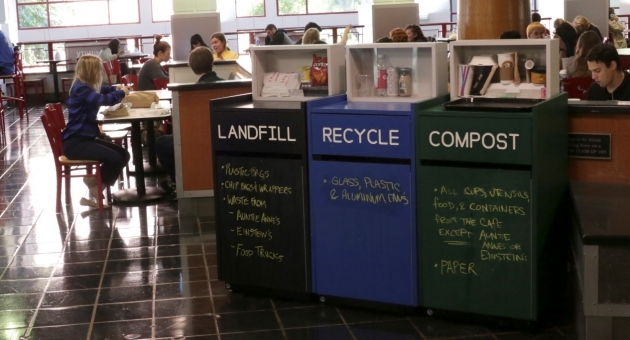
When Morgan Nemtuda, College of Engineering, Class of 2016, became involved with Students for Environmental Action (SEA) in 2012, the organization was already working to make Temple a more compost-friendly campus.
Two years later, the Valaida S. Walker Food Court located in the Student Center has introduced a new composting system.
Composting is the process of turning organic materials (such as uneaten food waste) into rich soil for use in gardens, landscaping, horticulture and agriculture. It is also an eco-friendly way of diverting waste from landfills.
According to Kathleen Grady, director of the Office of Sustainability, the push to compost at Temple was almost entirely student-driven. “This is something students really care about,” said Grady. “They were the ones who did all the necessary work to make this idea come to life.”
When Nemtuda noticed an interest in composting among students and faculty, she drafted a composting plan, collected signatures to demonstrate campuswide support, and presented the information to leadership in Student Affairs, Business Services, Operations and Housekeeping.
“As students, we don’t always know how decision making works at Temple, but when it comes down to it, we really do have the power to make these changes if we organize,” she said.
Because of students’ efforts, waste at the Valaida S. Walker Food Court is now sorted into three categories. Bins marked “Recycle” are for glass, plastic and aluminum items. Food waste and the service items, such as utensils and plates, provided at the food court are compostable. Other trash goes in a bin labeled “Landfill.”
The “Landfill” label is meant to remind students about where their trash ends up. Shadow boxes outline what can and can’t be composted or recycled to assist students in sorting their waste.
The decomposable organic waste is sent to an industrial composter in Delaware.
During the first two weeks of the semester, volunteers, who could be identified by their green shirts, served as "eco-reps" during peak hours at the dining facility to educate students about composting.
SEA hopes to expand the composting stations across campus in the future. “We hope to use the Student Center as a pilot program,” said Nemtuda. “We want to perfect our model in the best way possible.”
Eco-rep volunteer coordinator Austin Smith, College of Liberal Arts, Class of 2015, said that students’ reactions to the new composting stations have been overwhelmingly positive thus far.
“Composting is something that students are really excited about,” said Smith. “Most reactions that I’ve gotten are along the lines of ‘Wow! This is really cool. I’m so glad we’re doing this!’”
For information about getting involved with Students for Environmental Action, contact volunteerSEA@temple.edu.